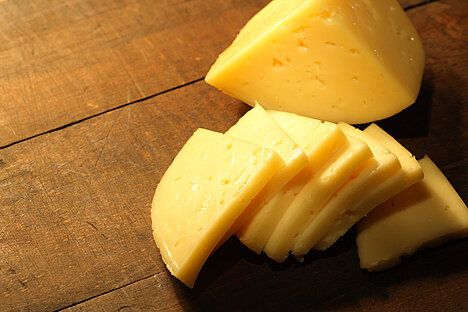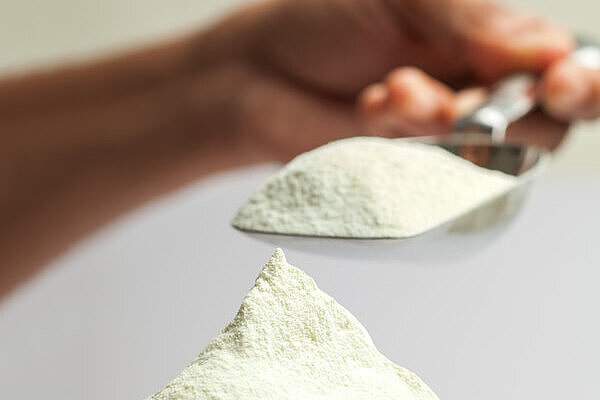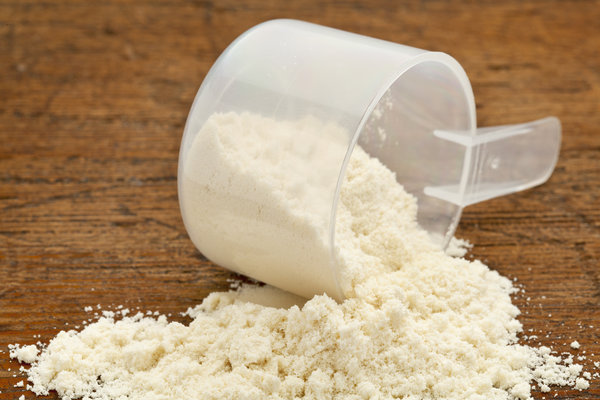Cheese powder

You may have heard of cheese powder or even used it in your kitchen. But did you know that it is also suitable for dogs? In this article, you will find out what cheese powder is, how it is made and what advantages and disadvantages it has for your four-legged friend.
What is cheese powder?
Cheese powder is a dry product made from cheese. The cheese is heated, dried and ground into a fine powder. The powder still contains all the nutrients of the cheese, such as protein, fat, calcium and vitamins. It has a long shelf life and can be used in a variety of ways.
How is cheese powder used for dogs?
Cheese powder can be used as a flavor enhancer or reward for dogs. For example, you can sprinkle it over dry food to make it more palatable. Or you can use it as an ingredient for homemade dog cookies. Some dogs also like a spoonful of cheese powder on its own as a treat.
What are the benefits of cheese powder for dogs?
Cheese powder has several benefits for dogs. Firstly, it can help to stimulate the appetite if your dog is eating poorly. Secondly, it can aid digestion as it contains probiotic bacteria. It can also support dental health as it stimulates salivation and reduces plaque. Last but not least, it can strengthen the immune system as it provides many vitamins and minerals.
What are the disadvantages of cheese powder for dogs?
However, cheese powder also has some disadvantages for dogs. For one thing, it can lead to obesity if you give it too much or too often. Cheese powder is very high in calories and fat. Secondly, it can lead to intolerances or allergies if your dog is sensitive to dairy products. Symptoms can include diarrhea, flatulence or itching. It can also lead to kidney problems if your dog consumes too much salt. Cheese powder is often very salty.
How much cheese powder can my dog have?
The amount of cheese powder you can give your dog depends on various factors, such as his size, weight, age and health. As a rule of thumb, no more than 10 percent of their daily calorie intake should come from cheese powder. This corresponds to about one teaspoon per 10 kilograms of body weight per day. If you are unsure how much cheese powder your dog can tolerate, it is best to ask your vet for advice.
Cheese powder can be a tasty and nutritious addition to dog food. It can improve the taste, aid digestion, care for the teeth and strengthen the immune system. However, it should only be given in moderation, as it can otherwise lead to obesity, intolerances or kidney problems. Therefore, pay attention to the quality and quantity of the cheese powder and monitor your dog for possible side effects.
If you notice any signs of hypersensitivity or poisoning in your dog, you should see your vet immediately. We are not a substitute for a vet, but we try to be as accurate as possible. Every dog reacts differently and we recommend you get a second opinion or consult your vet if in doubt.
Stay healthy and take good care of your four-legged friend!😊
Similar to Cheese powder
Milk powder is a product made by evaporating the water from milk. The solid components of the milk, such as protein, fat, carbohydrates, vitamins and minerals, are retained. The advantage of milk...
What is whey powder? Whey powder is a powder obtained by drying whey. Whey is the yellowish liquid that is produced during cheese production when the milk coagulates and separates into solid...
Yoghurt powder is a dairy product made by drying yoghurt. The water is removed from the yoghurt until only a fine powder remains. This powder still contains all the important ingredients of yoghurt,...
Eggs are an excellent source of high-quality protein, which is important for muscle building and cell regeneration. They also contain many vitamins (A, B, D, E, K), minerals (calcium, phosphorus,...



